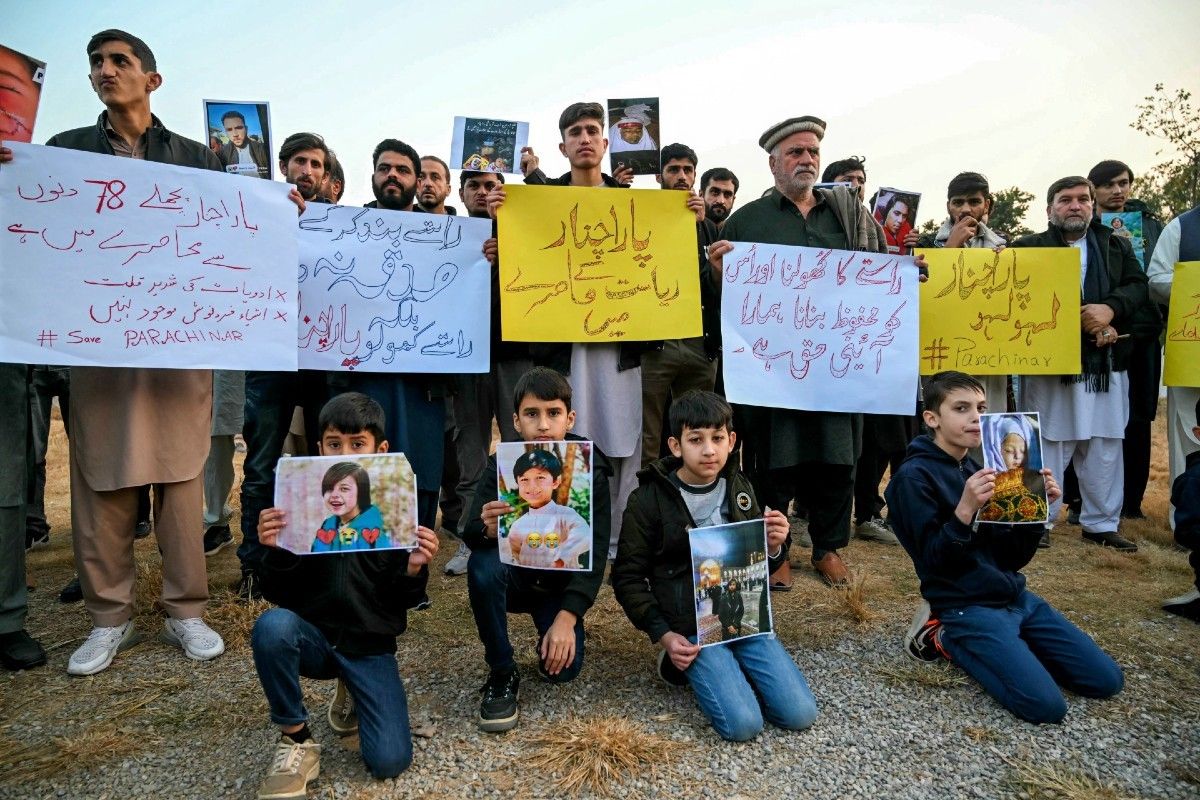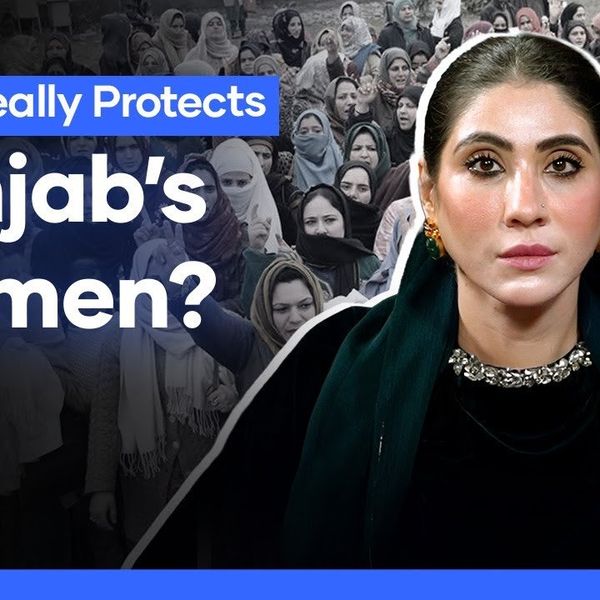Tribal peace sitting delays agreement in Pakistan's Kurram amid sectarian tensions and blockade
After months of consultations, Grand Jirga for peace postpones final agreement on peace deal amid dispute on weapons surrender

Kamran Ali
Correspondent Nukta
Kamran Ali, a seasoned journalist from Khyber Pakhtunkhwa, Pakistan, has a decade of experience covering terrorism, human rights, politics, economy, climate change, culture, and sports. With an MS in Media Studies, he has worked across print, radio, TV, and digital media, producing investigative reports and co-hosting shows that highlight critical issues.

Vital Tall-Parachinar highway blocked for 82 days, affecting 400,000 residents
Medical crisis worsens with reported deaths from lack of treatment access
Solidarity protests spread across major cities as humanitarian situation deteriorates
After a month of consultations in Pakistan's tribal region of Kurram, a crucial peace meeting known as a Grand Jirga has yet to reach a final decision, as participating stakeholders requested additional time for deliberation.
The jirga has been adjourned and will reconvene tomorrow, December 31, 2024, hoping to finalize a peace deal that could end a conflict that has claimed over 150 lives since November and left thousands of residents without access to food and medical supplies.
According to Barrister Muhammad Ali Saif, the jirga convener and advisor to the chief minister of Khyber Pakhtunkhwa (KP) on information, nearly 50 sessions of the Grand Jirga have been held. While consensus has been reached between parties on most issues, they have requested additional time to consult on a few remaining points.
"In the next session (on Tuesday), a final agreement will be reached, and both parties will formally sign the deal", Saif hoped.
Key points of peace pact
Jirga member Izzat Gul Orakzai told Nukta that a 14-point agreement has been presented to a joint jirga, aimed at resolving the long-standing conflict between Shia and Sunni tribes in Kurram.
The agreement stipulates that land disputes will be resolved through the Land Commission and the Murree Agreement, displaced families will be resettled in their native areas, and a joint committee will define terms for the collection of heavy and light weapons. Additionally, strict action will be taken against individuals involved in hate speech, no sect will provide protection to individuals attempting to disrupt peace, and all bunkers will be demolished within a month.
Barrister Saif stated that both parties must surrender their heavy weapons, dismantle all bunkers, and provide assurances that if an attack occurs in any area, the residents of that area will accept responsibility and pay a fine. "Government wants lasting peace, and is playing its role as arbitrator to facilitate parties," he added.
Parties’ reservations
Izzat Gul Orakzai stated that while both parties have reached an agreement on all other points, they remain divided over the issue of weapon collection. "Shia community feels threatened by Afghanistan, believing that weapons are being supplied to the Sunni community, while the Sunni community insists it will not collect weapons unless the Shia community does so first," he explained.
Ali Jawad, a jirga member representing the Shia community, told Nukta that despite facing threats from Afghanistan and being surrounded by the Sunni community in the area, they are still willing to surrender their weapons. "The Sunni community has been employing delay tactics because the Shia community is the most affected at present," he pointed out.
Ali Jawad and Izzat Gul believe that the jirga, government, and security forces will need to assure both parties of their round-the-clock commitment to maintaining peace once an agreement is reached.
Death toll in Kurram
The crisis erupted on November 21 when gunmen killed 43 passengers traveling from Parachinar to Peshawar, sparking retaliatory clashes between the Shia and Sunni communities. The violence has since claimed over 150 lives, left 200 people injured, and displaced hundreds of families. The closure of roads and shortages of food and medicine have deepened the crisis in Parachinar.
According to data provided to Nukta by Ali Jawad, Chairman of Civil Society Kurram, 128 children have died due to lack of medical treatment in various areas, including Shalozan, Borki, Ibrahimzai, Alizai, Kirman, and Malana. While hospitals and government officials have denied these claims, the District Headquarters Hospital in Parachinar has officially confirmed 31 deaths.
Addressing questions about the data's authenticity, Ali Jawad stated that people with medical conditions such as heart disease, kidney failure, and diabetes are dying at home without access to treatment, as even basic medications like Panadol are unavailable in hospitals. "Traditionally, people do not report deaths at hospitals or with administration, but we have members in all village councils so they share details after collecting information from the deceased family," he added.
According to the provincial health department, over 16,000 patients have received treatment, with more than 10 tons of medicine, including insulin, being supplied to different hospitals in Kurram.
On December 20, the provincial apex committee on security decided that both parties would sign a government-mediated agreement under which the parties are required to submit a plan for weapon surrender within 15 days, followed by the collection of weapons and removal of private bunkers by February 1, 2025.
Protests continue
As protests intensify in Peshawar, and Karachi, the main protest against the blockade in Parachinar enters its 10th day, as residents continue demanding an end to road blockages, food shortages, and medical neglect. The closure of the vital Tall-Parachinar highway over the past 82 days has severely disrupted daily life across more than 100 villages, affecting a population of over 400,000 people.
Muzamil Hussain, Tehsil Chairman and leader of the ongoing Parachinar sit-in stated that the people of Parachinar have been left with no options as they lack even basic means to alleviate their suffering. "There is no access to food and medical treatment so people are starving," he lamented.
In response to calls from Parachinar's protesters, solidarity sit-ins across various cities, including Karachi and Peshawar, have entered their fourth day. "The ongoing violence and brutality in Parachinar, which has resulted in the merciless killing of innocent civilians, shows no signs of abating. In response to this, our protest will persist until the demands of the people are addressed," said Ali Khan Bangash, President Imamia Jirga KP, speaking to Nukta in Peshawar.
In Karachi, protests continue at seven locations: Numaish Chowrangi in Saddar; Kamran Chowrangi and Johar Mor in Gulistan-e-Johar; Abbas Town on Abul Hasan Isphahani Road in Gulshan Town, Five Star Chowrangi and Rizvia in Nazimabad; Ancholi and Sharea Pakistan in Federal B Area.
Speaking to Nukta today, Majlis Wahdatul Muslimeen (MWM) leader Allama Hassan Zafar Naqvi stated, "The provincial government came for negotiations, but we did not meet with them because we have no demands of our own. Our sit-in is linked to the Parachinar protest - we will stay here as long as that continues."
Addressing concerns about the protests' impact, Naqvi highlighted in a press statement last night that demonstrators have maintained open routes and have not disrupted business activities. He criticized the inadequate relief efforts in Parachinar, questioning how a single helicopter could provide for a population of 500,000 people.
While affirming respect for security institutions, he warned against the Sindh government attempting to politicize the demonstrations. "This is not any party's protest but a protest of the oppressed; everyone is participating," Naqvi stated, noting the support from various communities, including Ahle-Sunnat leaders who have set up water stations at protest sites.
*Additional reporting by Ahmer Rehman










Comments
See what people are discussing